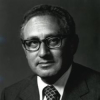Henry A. Kissinger

Henry A. Kissinger
Henry Alfred Kissingeris an American diplomat and political scientist. He served as National Security Advisor and later concurrently as United States Secretary of State in the administrations of presidents Richard Nixon and Gerald Ford. For his actions negotiating the ceasefire in Vietnam, Kissinger received the 1973 Nobel Peace Prize under controversial circumstances, with two members of the committee resigning in protest. Kissinger later sought, unsuccessfully, to return the prize. After his term, his advice has been sought by world leaders...
NationalityGerman
ProfessionStatesman
Date of Birth27 May 1923
CountryGermany
The China of the 1970s was a communist dictatorship. The China of the twenty-first century is a one-party state without a firm ideological foundation, more similar to Mexico under the PRI than Russia under Stalin. But the measurement of the political and the economic evolution has not yet been completed, and is one of the weak points of the system.
America has made it very clear in several administrations that if there is an attack by China on Taiwan, the United States is very likely to resist.
Well it did not make excessive sense to say that 20 million people are the recognized government of a billion people that have their own institutions. We did not change it in the sense that we said this has to end, but there was a U.N. vote that transferred the legitimacy of China from Taiwan to Beijing. Beijing was recognized as the government of all of China. Then, under President Carter, we followed what the U.N. had already done eight years earlier.
I have great respect for the Taiwanese. They have done an extraordinary job. But it was not a sustainable position to say that the legitimate government of China resides in Taiwan, which at that time didn't have much contact with the mainland.
Well, I don't know whether it caused anguish in China, but it was not a wise way to proceed. But one has to remember that it was the first experience. And in a Republican administration, there is a conservative wing that looks at China as the last embodiment of communism, which therefore tends towards a more bellicose rhetoric anyway than I would. It's not the dominant element, but every once in a while they get a crack at public statement.
I had an opportunity to express my views, yes. I agreed with the approach which we took, namely, to make a distinction between the loss of life of the Chinese pilot and our military operations outside territorial waters or territorial limits.
We first became conscious of the plane publicly on a Monday. I thought then by the weekend it would be done. But then the Chinese military, the defense minister made a statement saying that if there was no apology from the United States, the Chinese military and the Chinese people would never understand. No reference to the government or the Communist Party, and that obviously presented an internal problem to the Chinese leadership, which was travelling at that moment.
The American formal position has been that we oppose violence by governments against their people. That principle should not be abandoned.
I do not criticize people who take a public stand on human rights issues. I express my respect for them. But some people are more influential without a public confrontation.
American politics are normally a result of pragmatic and not philosophical reasoning. No one in Washington has said we now prefer multilateralism.
Access to natural resources can become a question of survival for many states.
China is a one party state. Sooner or later China will get to the point when the new social classes, which have emerged thanks to economic success, will have to be integrated into the political system. There is no guarantee that this process will run smoothly.
I am against portraying China as the demon of the global community. China has grasped more quickly than other countries what globalization means and what it demands. The country has learned how to use other people's innovations for itself. India, incidentally, is not far behind China in this respect. Both are not nations in the European sense, but rather cultural communities with enormous markets. The challenge of the future is to work out how to deal with that.
Well, on the American side, every new administration has to cut its teeth in a crisis, because before a crisis, you don't really know what your various subordinates are thinking under stress.